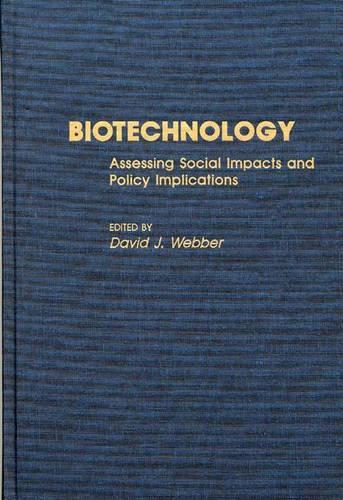
Biotechnology: Assessing Social Impacts and Policy Implications
(Hardback)
Publishing Details
Biotechnology: Assessing Social Impacts and Policy Implications
By (Author) David J. Webber
Bloomsbury Publishing PLC
Praeger Publishers Inc
24th August 1990
United States
Classifications
Professional and Scholarly
Non Fiction
660.6
Physical Properties
Hardback
256
Description
This collection of 14 essays written by researchers on a variety of topics related to biotechnology focuses on the social, ethical, economic, legal and political aspects of biotechnological applications. Usually defined as any technique that uses living organisms or processes to make or modify products, to improve plants or animals, or to develop micro-organisms, biotechnology has political characteristics similar to those of other technological advances, such as applications of artificial intelligence in manufacturing or new procedures in medicine. In all of these innovations, the rapid application of new scientific knowledge challenges existing social values, legal and political protections, and production processes. In presenting some of the technically and politically complex policy issues that need to be faced by local, state, and national-level policy makers, as well as academic, business, agricultural, and medical institutions during the next decade, these chapters anticipate an array of social, economic and institutional consequences that will occur if biotechnology gains wide acceptance. The volume is divided into four sections that assess various facets of the biotechnological phenomenon. In part 1, biotechnology's social and political dimensions are probed in three chapters that examine the subject from three very different perspectives. American universities, agricultural co-operatives, and developing countries are the focus of part 2 which investigates the response of institutions to biotechnological development. In part 3, biotechnology's potential impacts are gauged in three chapters that analyze economic and legal influences, inquire into the dairy industry and regulation of genetically engineered organisms, and evaluate regulatory experience with food safety. The final section is devoted to a presentation of public policy responses to biotechnology and includes four chapters that centre on issue development and responsibilities, economic development and public policy as they relate to biotechnology, and a challenge to congressional policy makers and policy analysts.
Author Bio
DAVID J. WEBBER is an Associate Professor of Political Science at the University of Missouri-Columbia. He is active in the Policy Studies Organization and edited a symposium issue of Policy Studies Journal entitled Biotechnology, Agriculture, and Public Policy (1988).
